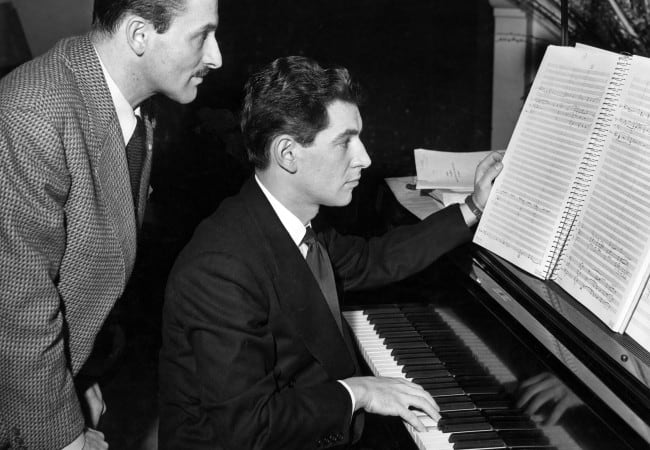“We are almost telepathically close. Sometimes we compose startlingly similar music on the same day, without seeing each other.” – Marc Blitzstein on Leonard Bernstein
2018 marks the centennial of the birth of Leonard Bernstein. Bernstein and Blitzstein shared an especially close friendship, and Bernstein served as one of Blitzstein’s most vocal proponents and champions.
Blitzstein and Bernstein met in 1939 when Bernstein led a production of The Cradle Will Rock at Harvard. Their meeting led to an “instant and lifelong” friendship, a relationship which Howard Pollack describes as “so symbiotic as to make it difficult to pinpoint influence.” The nature of their friendship is documented in the many letters and telegrams they exchanged, and by Bernstein in his own writings and interviews.
Bernstein premiered three of Blitzstein’s most important works, giving the premiere of the orchestral version of Cradle (New York City Center, 1947), as well as the Boston-area premiere of the piano-only version while a senior at Harvard in 1939; Airborne Symphony (New York City Symphony, 1946), which he also recorded twice; and the Boston try-out of Blitzstein’s adaptation of The Threepenny Opera (Brandeis University, 1952). Furthermore, Bernstein dedicated his 1952 opera Trouble in Tahiti to Blitzstein, and Blitzstein in turn dedicated his Six Elizabethan Songs (1958) to Bernstein.
Their relationship extended well beyond the professional realm. The Bernsteins named Blitzstein godfather to their firstborn daughter, Jamie, for whom Blitzstein composed a short work for solo piano, Innocent Psalm. Bernstein’s two younger children were also named for characters in Blitzstein’s works – Alexander, named for Alexandra (Regina), and Nina (Reuben, Reuben).
“I was tremendously influenced by Marc in everything I wrote for the theater and even some things that weren’t.” – Bernstein on Blitzstein
Learn More
Eric Gordon’s Mark the Music: The Life and Work of Marc Blitzstein (St. Martin’s Press, 1989) and Howard Pollack’s Marc Blitzstein, His Life, His Work, His World (Oxford University Press, 2012) each offer rich detail of their friendship and collaborations.
The Leonard Bernstein Letters, ed. Nigel Simeone (Yale University Press, 2013), includes select correspondence between Bernstein and Blitzstein.
“Love and Betrayal”, episode 2 of Guy Livingston’s 4-part radio documentary, The Cradle That Rocked.
Bernstein Centennial Exhibit at the New York Public Library for the Performing Arts & the Skirball Center
Pianist Lara Downes releases world premiere recording of “Innocent Psalm”
Bernstein on Regina
Bernstein performs Blitzstein’s “Zipperfly”
https://youtu.be/VixrUZOppdI






